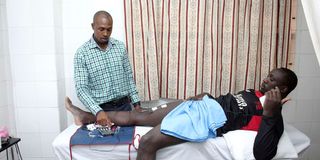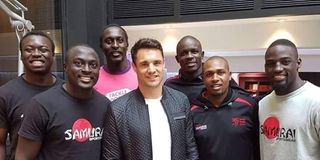Premium
Lamech Bogonko: South Africa's priceless gift to Kenyan rugby

Lamech Bogonko admits that from an early age, seeing his favourite players miss action due to injuries disturbed him to the core. PHOTO| DENNIS ONSONGO
What you need to know:
- He was headhunted by the former Kenya Sevens Head Coach, South African Paul Treu in 2013 after they had interacted while he was pursuing his undergraduate degree in physiotherapy at the University of Western Cape in South Africa
- Coincidentally, it's his love for Manchester United that sparked his interest in Physiotherapy and Sports Science almost two decades ago
- According to Bogonko, most of the injuries that rugby players grapple with affect their knees and ankles due to the nature of the sport
Lamech Bogonko, the Kenya Sevens physiotherapist, stands on the sidelines watching one of the final training sessions of the season at RFUEA grounds in Nairobi.
He keeps a keen eye on the players observing their movements but not to assess their technical skills that is passing, running into space, or gauging their attacking or defensive setup. His focus is mainly on any hint of discomfort amongst the players.
“When I came yesterday, he saw that I had a slight limp, he just had to start with a simple tape underneath. A couple of guys you can see, he just looks at you and sees A, B, C, and once the player admits then he gets into a plan of action," Kenya Sevens co-captain Vincent Onyala said, appreciating Bogonko’s astuteness as the team’s physiotherapist.
A physiotherapist is a professional whose main responsibility is to ensure the players are physically adept to train and compete while also providing key advice on the prevention of injuries. In a high-contact sport such as rugby, injuries are inevitable. His input is vital in the rehabilitation of injured players.
Bogonko has been with the national rugby sevens team for 10 years. He was headhunted by the former Kenya Sevens Head Coach, South African Paul Treu in 2013 after they had interacted while he was pursuing his undergraduate degree in physiotherapy at the University of Western Cape in South Africa.

Kenya Sevens physiotherapist Lamech Francis Bogonko (left) attends to rugby player Oscar Ayodi during the interview with Nation Sport on December 16, 2016.
Treu coached the South African national rugby sevens team, the Blitzbokke, to a World Sevens Series title in 2009 but resigned from the Kenya Sevens team after only one season.
“I have known him since I met him in South Africa. He approached me to be part of his technical bench," revealed Bogonko who is a passionate Manchester United fan.
Coincidentally, it's his love for Manchester United that sparked his interest in Physiotherapy and Sports Science almost two decades ago.
“I used to watch a lot of Premier League, I could see the medics who were treating players and all that,” opened up Bogonko, who enrolled at the Western Cape University in South Africa to study physiotherapy and sports science.
Advancing his studies in South Africa proved to be a blessing in disguise as he became exposed to the country’s rich sporting culture.
“I happened to join the university team for rugby and during that time, I worked with the university's cricket team and that’s how I ended up in the Western Province setup. I was more into rugby, cricket into all of that. I also managed to get into Santos football club, where Musa Otieno and Brian Mandela were based,“ he recounted.
Bogonko, who also did his Master’s degree at the same university, focused his thesis on sports injuries among Kenyan rugby players. When he took the reins from his predecessor, Bogonko introduced the concept of pre-rehabilitation.
“People never used to do screening before the season starts. So those are the things we have brought in so that there’s cardiovascular screening…there’s all the body screening, what we want to see are your muscle strengths, muscle length, what are you conditioning in terms of fitness," he revealed, adding that his assessment also entails looking at the history of previous injuries that have plagued players.

Lamech Bogonko (right) with former Springboks Head Coach Peter De Villiers.
The players value his input.
“My first tour to New Zealand I saw that all those players were being massaged, and when they were getting into the field they were playing like they could stretch, having to see how a human being can reach that elastic limit," said Onyala.
“And now bring it back home, we have our own Lamech Bogonko for the team. When I was injured, he took me through the recovery process and I’d say having him and having physiotherapy in the team, and having that in a sporting team is a benefit.”
According to Bogonko, most of the injuries that rugby players grapple with affect their knees and ankles due to the nature of the sport. In recent times, there’s been an increase in shoulder injuries. Mitigation is key to preventing or reducing their occurrence.
“We give what we call pre-rehabilitation exercises even before the injury, so there’s a lot of strength building, joint range of motion, and flexibility and pre-rehabilitation exercises during the off-season and the season. Most of the time when the season starts, we must make sure that the players have no injury," Bogonko, who has done numerous academic papers on physiotherapy in partnership with his alma mater the University of the Western Cape and Kenyatta University, said.

Lamech Bogonko (second right) poses with former Kenya Sevens players Humphrey Kayange, Collins Injera, Andrew Amonde, Billy Odhiambo, Sammy Oliech and former New Zealand All Blacks Star Dan Carter (centre).
He has also witnessed the sport evolve from brawn to brain. The physicality, Bogonko observes, is still there but players have become more skillful.
“Rugby is changing from what we found in 2013, the sport needed quite bulky guys, and now it has moved to agility and skill. If you are free of injury and you are skillful you can play the sport,“ he pointed out.
Bogonko, who has changed his passport four times in the past decade, is the only constant in the national rugby sevens team setup and travels to every leg of the World Sevens series.
He has witnessed Shujaa’s varied fortunes; from winning the Singapore Sevens title in 2016, qualifying for the Olympic games thrice, being relegated from the World Sevens series, players retiring, players revolting over pay, and much more.
“It’s a very demanding job in terms of travel, you are out of the country without your family most of the time…I married at the same time (2013). When you travel it's on and off, two weeks on, two weeks off," said Bogonko, who admits that the constant travel sometimes takes a toll on his personal life.
His passion for physiotherapy is evident on his social media pages as well. He constantly reposts and reshares content revolving around sports science. He recommends sports teams to be wary of using physiotherapists who don’t have the requisite credentials.
“Don’t just take someone from the gym to come and train the team, make sure you are getting a proper certified sports scientist.
"Sports physiotherapy has evolved, you can’t just be doing physiotherapy alone you must be able to bring in sports science so that you are more of a strength and conditioning coach and at the same time you are a sports rehabilitation specialist so that you can combine all that to make players ready to play again," underlined Bogonko, who runs a physiotherapy and sports injury clinic in Pangani, Nairobi.




